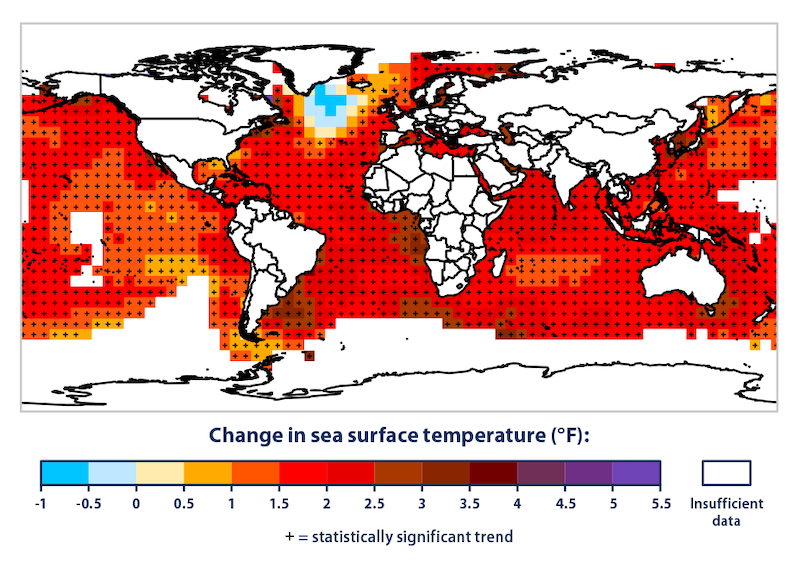An unprecedented streak of ocean heat has entered a second year, troubling scientists who say the jump in sea surface temperatures – said to have spread to more than 90% of the oceans’ surfaces last year – is more dramatic than anything they have ever seen.
The World Meteorological Organization’s annual State of the Global Climate report, published on Tuesday, said records were broken, “and in some cases smashed”, for greenhouse gas levels, surface temperatures, ocean heat and acidification, sea level rise, Antarctic sea ice cover and glacier retreat.
They fear the changes could represent a major change to Earth systems that cannot be reversed, according to a report by the Washington Post that said the warming extends far beyond the Pacific Ocean to the Atlantic, where temperatures are 1-2C above a 1971-2000 baseline, and waters off South Africa, Japan and the Netherlands.
ALSO SEE: Hong Kong Security Law Has Global Firms Racing to Shield Secrets
The WMO said global average sea surface temperatures hit records every month, with most exceptional warmth in the eastern North Atlantic, the Gulf of Mexico and Caribbean, plus the North Pacific and large parts of the Southern Ocean.
The records set in July, August and September were by a particularly wide margin.
Seeing such dramatic warming throughout Earth’s oceans was alarming, given that it takes far more energy to warm water than it does the air, WMO Secretary-General Celeste Saulo said.
“The time scale of the oceans is not as fast as the atmosphere,” Saulo said at a news conference. “Once a change is established, I would say it’s almost irreversible in time scales that go from centennial to millennial.”
Warmer oceans are already having devastating impacts on coral reefs, such as the Great Barrier Reef off eastern Australia, where there has been more coral bleaching, which has also been seen in corals around Florida.
A potentially more worrying threat is that the warming may push a key Atlantic Ocean current to collapse.
Researchers say some fish are struggling to find cool water within their normal areas, while others are growing more rapidly at younger ages.
‘The defining challenge for humanity’
Oceanographers say the rise in ocean heat followed three years of the La Niña weather pattern, which usually suppresses global warming, and some are hoping there may be a switch from the current El Niño pattern back to La Niña in the second half of this year.
Professor Saulo said the climate crisis is “the defining challenge that humanity faces”.
“Heatwaves, floods, droughts, wildfires and intense tropical cyclones wreaked havoc on every continent and caused huge socio-economic losses [in 2023]. There were particularly devastating consequences for vulnerable populations who suffer disproportionate impacts,” she said.
“Extreme climate conditions exacerbated humanitarian crises, with millions experiencing acute food insecurity and hundreds of thousands displaced from their homes.”
She said the WMO was stepping up collaboration with the international community to confront the enormity of this challenge.
It and its members were expanding early warning services to try to save lives when people are threatened by drought, floods and other types of extreme weather.
- Jim Pollard
NOTE: A short video was added to this report on March 21, 2024 and the top image changed on March 22, 2024.
ALSO SEE:
South Korea’s $313bn Loan Plan For Carbon-Cutting Projects
China Misses 2023 Emissions Targets, ‘Climate Credibility at Risk’
China Ramping up Its Transition to Clean Energy, Grid Storage
US Startup, Singapore to Build an Ocean Carbon Removal Plant
China Dominates Clean Energy, as Well as EV Batteries – FP
Cities Lead COP28 Climate Change Push as Nations Fail to Deliver
China Carmakers Lead EV Race But Lag in Carbon Shift – SCMP
























